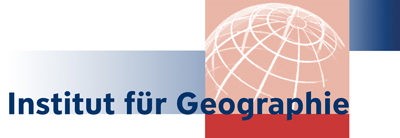Markus Lambracht
Markus Lambracht, M.A.
Researcher and project manager in the Research Group Regional Development of Prof. Dr. Tobias Chilla.
Newsroom: www.regionalentwicklung.bayern
Research focus on European Spatial Development, Border Studies as well as Regional Economic Geography, thereby especially on quantitative analysis and data visualization.
PhD-Project:
‘Relief matters?’ The role of relief in socioeconomic development based on the example of the Alpine region.
Due to their geographical location, mountain regions are often perceived as socioeconomically disadvantaged areas. From the perspective of traditional geography, regions are seen as physically-spatially given and thus have long been subject to a deterministic understanding of space. In constructivist social geography, spaces were then seen as the results of social (negotiation) processes, which tends to reject the explanatory significance of the relief.
With the ‘material turn’ in the spatial sciences, concepts with a post-discursive orientation have increasingly come to prominence in recent times, emphasizing not only relational perspectives but also the importance of non-discursive ways of considering space. Materiality, i.e. the physical nature of spaces, has regained relevance after being broadly absent from constructivist approaches. In the context of these debates, functional arguments now assume a new significance.
This is where my research on the Alpine region in terms of socioeconomic development comes in. In my research, I focus on the role of relief – in the sense of topography and surface structure – in relation to the development of socio-economic trends in mountain regions. In a narrow sense, spatial patterns with comparable initial situations in terms of relief and location and their development paths are of particular interest. Through a combination of statistical calculations with remote sensing data, spatial patterns in the Alpine region are first identified and relations are explored. These spatial patterns are then assessed and contextualized by case studies.
The work highlights the role of surface structure as a material spatial aspect for the socioeconomic development of mountain regions. To overcome geo-deterministic simplifications, specifics are elaborated at the smallest possible spatial level (share of settlement area in the total area, differences in altitude, accessibility, etc.) and combined and scrutinised in a multi-faceted way.
Scientific publications
- Bertram, D., Lambracht, M. & T. Chilla (2024): Settlement Systems in Mountain Regions: A Research Gap? Mountain Research and Development, 44(2). DOI: 10.1659/mrd.2023.00021
- Lambracht, M. (2023): Spatial development in the European Alps: Topographic Potential Area as a basic indicator for policy debates. Papers in Applied Geography, 10(1). DOI: 10.1080/23754931.2023.2264289
- Bertram, D., Chilla, T. & M. Lambracht (2023): The Alpine settlement system: capturing relevance beyond size. Journal of Maps, 19(1). DOI: 10.1080/17445647.2022.2164229
- Chilla, T., Bertram, D. & M. Lambracht (2023): Städte und Siedlungssystem der Alpen. Geographische Rundschau, 3 (2023) (Themenheft Der Alpenraum), 14-19.
- Chilla, T. & M. Lambracht (2022): Institutional mapping of cross-border cooperation. INTERREG programme analyses with KEEP data. European Planning Studies, 31(4). DOI: 10.1080/09654313.2022.2058321
Book chapters
- Chilla, T. & M. Lambracht (2022): ARGE ALP – Eine starke Region trotz oder wegen der Berge? In: Staudigl, F. & P. Bußjäger (Hg.): Von der “Revolution der Provinzen” zur Zukunft des Alpenraumes: 53-64. Online unter: https://www.argealp.org/fileadmin/user_upload/Allgemein/Publikationen/Band_138_DE_Abzug_5_compressed.pdf
Reports and working paper
- Chilla, T., Paul, H., Bertram, D. & M. Lambracht (2024): Towards an Alpine Spatial Development Perspective – Synthesis Report: Compilation of three input papers. DOI: 10.13140/RG.2.2.20527.24482
- Lambracht, M. & T. Chilla (2024): Mapping Alpine Textile. Economy, institutions and labels. Research report with in the Interreg Alpine Space project AlpTextyles. Online unter: https://www.alpine-space.eu/wp-content/uploads/2024/07/09.-FAU_research_1_Mapping-Alpine-Textiles.pdf
- Lambracht, M. & T. Chilla (2024): Mapping Alpine Wool. Production network, value creation and footprint. Research report with in the Interreg Alpine Space project AlpTextyles. Online unter: https://www.alpine-space.eu/wp-content/uploads/2024/07/10.-FAU_research_2_Mapping-Alpine-Wool.pdf
- Chilla, T., Bertram, D. & M. Lambracht (2023): Mapping the Scene: Cartographic sketches linked to the EUSALP cross-cutting priorities – EUSALP Annual Forum organised by the Swiss Presidency. Working Papers FAU Regional Development No. 5, DOI: http://dx.doi.org/10.13140/RG.2.2.16988.16007
- Chilla, T. & M. Lambracht (2023): Regionalräte: Bestandsaufnahme und Potentialanalyse im Bereich der grenzüberschreitenden Zusammenarbeit, Studie im Auftrag des Auswärtigen Amts, DOI: 10.13140/RG.2.2.35119.82089
- Chilla, T., D. Bertram & M. Lambracht (2022): “Alpine Towns – Key to Sustainable Development in the Alpine region. Part 1: Facts, Maps and Scientific Debates.” In: 9th Report on the State of the Alps, DOI: 10.13140/RG.2.2.36022.98880/1
- Chilla, T., Bertram, D., Lambracht, M. & C. Wilhelm (2022): Innerdeutsche Vernetzung von Grenzregionen. Dokumentation des Workshops von 16./17. Mai 2022 im Auftrag des Bundesministeriums des Innern und für Heimat, Technical Report, DOI: 10.13140/RG.2.2.25321.16484
- Chilla, T., S. Hippe & M. Lambracht (2022): Evaluation des Bayerischen Zentrums für Tourismus (BZT); im Rahmen des Vorhabens BZT — Evaluierung der Förderung und der Entwicklungsoptionen; im Auftrag des Bayerischen Staatsministeriums für Wirtschaft, Landesentwicklung und Energie (StMWi)
- Chilla, T., S. Hippe & M. Lambracht (2022): Kontextinformationen zur Evaluation des Bayerischen Zentrums für Tourismus – Wirtschaft, Wissenschaft, Vernetzung; im Rahmen des Vorhabens BZT — Evaluierung der Förderung und der Entwicklungsoptionen; im Auftrag des Bayerischen Staatsministeriums für Wirtschaft, Landesentwicklung und Energie (StMWi)
- Chilla, T., Gold, A., Lintzmeyer, F. & M. Lambracht (2022): Assessment study on cross-border spatial development in the Alpine Convention area. Online unter: https://www.alpconv.org/fileadmin/user_upload/Organisation/TWB/SPSD/Assessment_study_Cross-border_Cooperation.pdf
- Chilla, T. & M. Lambracht (2022): Land take in the Alpine region: the data perspective. Contribution to IP_S2, Step 1 of the Alpine Climate Target System. Online unter: https://www.alpconv.org/fileadmin/user_upload/Organisation/TWB/SPSD/CDR_ACTS_IP_S3_1a_Land_Take_Data.pdf
- Lambracht, M. & T. Chilla (2022): ESPON tool for mapping soft territorial cooperationareas and initiatives — Experience from Alpine Region. Annex 7. Online unter: https://www.espon.eu/sites/default/files/attachments/Annex%207%20-%20Experience%20from%20the%20Alpine%20region.pdf.
- Bertram, D., Garkisch, J., Geiger, W., Haack, A., Hellwagner, T., Hippe, S., Lambracht, M., Müller, C. & J. Reizlein (2019): Räumliche Integration: Das Beispiel der bayerischen Grenzregionen zu Österreich und Tschechien. Working Papers FAU Regional Development No. 3, DOI: http://dx.doi.org/10.13140/RG.2.2.21585.25440
Presentations
- “AlpTextyles – Intertwining cultures”. Presentation of the project and key results during the International Wool Textile Organization (IWTO) roundtable 2024. Online auf YouTube. 28.11.2024, Istanbul.
- “Textile value chains in the European Alps – circular economy and sustainability”. Guest lecture during the New European Bauhaus Days. 24.10.2024, Ljubljana.
- “Relief matters – A spatial analysis of Topographic Potential Areas (TPA) in the European Alps”. 35th International Geographical Congress. 27.08.2024, Dublin.
- “A map of textile origin and quality labels”. AlpTextyles Research day. Online auf YouTube. 12.03.2024, Lyon.
- “Mapping the wool sector from an economic perspective”. AlpTextyles Research day. Online auf YouTube. 12.03.2024, Lyon.
- Kurzvorstellung der Studie zu den Regionalräten. Im Rahmen der Informationsveranstaltung zur grenzüberschreitenden Zusammenarbeit von Dr. Anna Lührmann, Staatsministerin für Europa und Klima, für MdB der Ampelfraktionen aus grenznahen Wahlkreisen. 19.10.2023, Berlin.
- “Das Siedlungssystem der Alpen: Nachhaltige Raumentwicklung in Non-Standard Geographies”. Im Rahmen der AlpPlan Session: Alpine Raumordnung in Zeiten von Klimawandel und Energiewende. Deutscher Kongress für Geographie 2023. 20.09.2023, Frankfurt.
- “Alpine Towns: Maps, Facts, Challenges: Insights to the scientific analysis”. ‘Alpine Towns’ Conference. 09.11.2022, Bern.
- “Alpine Towns – neue Erkenntnisse aus dem 9. Alpenzustandsbericht”. Institutskolloquium des Instituts für Geographie Erlangen. 09.02.2022, Erlangen.
Press
- „AlpTextyles: Collaborative solutions for a heritage & consumer sensitive relocalization of sustainable, circular, and innovative Alpine textile value chains“. Radiotelevisione svizzera (06.07.2024)
Current projects
- ASTER (2024-2027): Alpine Solutions for the Transition of the textile and plastic Equipment industry and the harmonization of interregional 5R strategies; Projektpartner und Working Package Leader (Classic Project im Interreg Alpenraumprogramm 2021-2027)
- AlpTextyles (2022-2025): Collaborative solutions for a heritage & consumer sensitive relocalization of sustainable, circular, and innovative Alpine textile value chains; Projektpartner und Working Package Leader (Classic Project im Interreg Alpenraumprogramm 2021-2027)
- Fachliche Unterstützung des BMWSB in der Alpenkonvention, Arbeitsgruppe Raumplanung und nachhaltige Entwicklung (2024-2030): Als Bietergemeinschaft gemeinsam mit ifuplan.
Passed projects
- Als Unterauftragnehmer gemeinsam mit ifuplan: Fachliche Unterstützung des BMI in der Alpenkonvention (2021-2024)
- Studie im Auftrag des Auswärtigen Amts (2022-2023): Regionalräte – Bestandsaufnahme und Potentialanalyse im Bereich der grenzüberschreitenden Zusammenarbeit. Hier gibt es weitere Informationen rund um die Studie.
- Erstellung eines Regionalmonitoring-Tools für den Landkreis Kitzingen (2022-2023)
- Alpenzustandsbericht zum Thema Alpine Städte (2020-2022) (i.A. des Schweizer Amtes für Räumliche Entwicklung, gemeinsam mit Climonomics). Hier gibt es weitere Informationen rund um den RSA9.
- ESPON ACTAREA (2020-2022): Thinking and planning in areas of territorial cooperation – web app (mit Spatial Foresight und University of Geneva)
- Evaluation des Bayerischen Zentrums für Tourismus (BZT) (2022): Im Rahmen des Vorhabens Bayerisches Zentrum für Tourismus — Evaluierung der Förderung und der Entwicklungsoptionen; im Auftrag des Bayerischen Staatsministeriums für Wirtschaft, Landesentwicklung und Energie (StMWi). Hier gibt es weitere Informationen rund um die Evaluation.
- Studie im Auftrag des BMI (2020): Innerstaatliche Vernetzung von Grenzregionen. Hier gibt es weitere Informationen rund um die Studie.
- Als Unterauftragnehmer: Evs46 Grundlagenermittlung und Prozessbegleitung (2020): Integrierte Grenzraumentwicklung in den Euregios via salina und ZWK in Zusammenarbeit mit Euregio Inntal und Regionalmanagement Schwaz
- Since 2021: Researcher and project manager in the Research Group Regional Development of Prof. Dr. Tobias Chilla at the Institute of Geography
- 2018 bis 2021: Studied human geography (Kulturgeographie), MA (FAU Erlangen-Nuremberg) with a specialisation in regional development, Master’s thesis on “Cross-Border Governance – Cooperation intensity and degree of institutionalisation of regional cross-border cooperation in German border regions”
- 2017 bis 2020: Worked at the Institute of Geography as a student assistant, e.g. in the Research Group Regional Development of Prof. Dr. Tobias Chilla
- 2015 bis 2019: Studied human geography (Kulturgeographie), BA (FAU Erlangen-Nuremberg)

